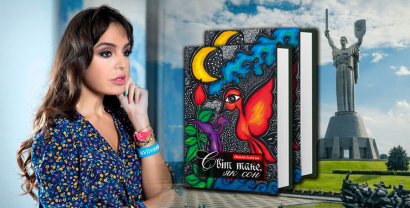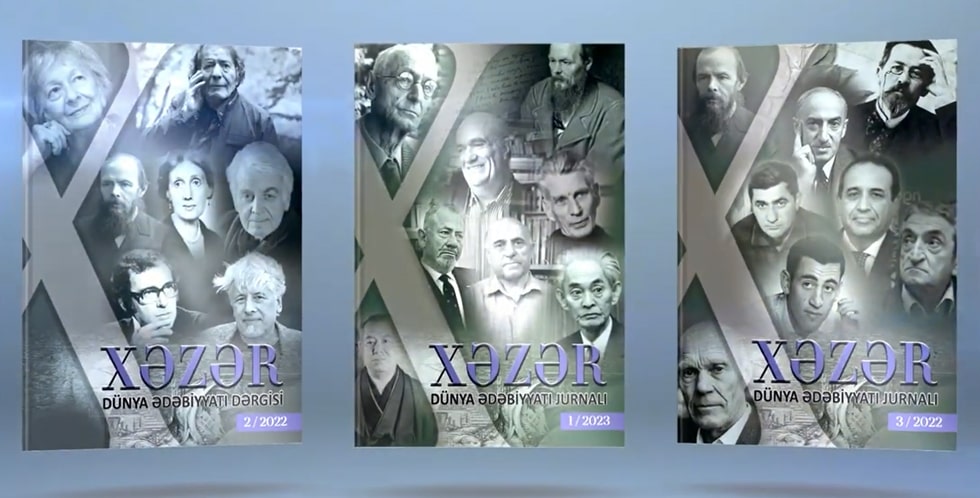Leyla Aliyeva’s Collection of Poems Published in Kyiv

Young poet Leyla Aliyeva’s book in Ukrainian titled Svit tane, yak son (The World Dissolves like a Dream) has been produced by Kyiv-based “Yaroslavov Val” Publishing House.
The gift to dissolve one’s pain into artistic expression...
Dear reader! You are holding the Ukrainian translation of the book “Свiт тане, як сон” (The World Dissolves like a Dream) by the young Azerbaijani poet, Leyla Aliyeva, who is known not only to the readership across the Caucasus, but also to Euroepean lovers of good solid syllabo-tonic poetry. Her book in English translation ('The World Dissolves like a Dream') was launched in London in 2018 and in Belarusian translation, titled 'Ліст' in Minsk in 2016.
What is she like - the lyrical heroine of Leyla Aliyeva? My feelings tell me this woman, who is deep and meaningful, is a romantic at heart and has the ability to see something SPECIAL in SIMPLE things. And she is also an altruist and a person who believes that everything in our life has long been decided by heavenly forces ... And only God knows humanity's mysteries, forgives sins and always leads the righteous to the shining path of universal love.
Black swan, you’re forever alone,
Is it possible to believe a dark,
abandoned soul?
You are alone, so graceful and severe,
So beloved and so completely alone!
Black swan, hundreds of phrases drown in the river,
Hundreds of moments of our lives
drown in the depths.
Black swan, I know,
not for the first time
Time-forgotten shadows
greeted us there!
Black swan with a soul,
as bright as the sun.
Thank you for these minutes!
Black Swan,
my day was rewarded by beauty!
For this I shall not forget you!
By the way, it is worth noting that the young author is not an urbanist, like most of the poets of her generation. Leyla is in love with nature, with its inner meditative essence, with the existential formula of the whole living world.
Although Leyla Aliyeva's poems contain many fascinating wanderings, admiring other cities and countries, she is most in love with her native Azerbaijan:
The smell of the Caspian Sea, the streets of the Old City,
The summer heat, Khazri, Gilawar,
A noisy crowd of guests,
turning up without occasion...
Baku, my home town, darıxdım neyi var…
Sometimes it seems that her heroine, who is ordinary by physical appearance but so complex by intrinsic nature, is never tireless, always searching for women's happiness, for example, in “I am that woman / Who is waiting for the bus / Of colouring dreams”. And in the evening the bus of her colouring dream again and again brings her back home, which is cozy and dearer ...
Sadness knocks at the door in the evening quiet,
I forgot to fasten the locks,
Come in, unexpected guest,
Visitors are never dull.
Come in, come in, I'll pour you tea,
And choose the sweetest jam.
I'm with you, sadness, you won’t grow bored,
We’ll have time enough for that!
Maybe tomorrow morning you'll leave,
Promising to return in the evening.
Well, if it rains in the morning,
Then you’ll snuggle close to my heart!
You know, sadness, I didn’t expect you,
And I'm happy to argue with you,
It’s just that I poured tea for two
For I know you drop in so often!
You know, sadness, I must have been rude,
I surely drove you away,
I'm still waiting for you to take pity,
And not steal away precious time!
Maybe I should smash all the clocks?
How else can you fight time?
So, sadness, now you’re here
You’d make me happy if you decided to stay!
Leyla Aliyeva's book is a dramatic sense of the troubles of Earth time. The nature and naturalness of this poetic heritage are combined with the pramatter of the word. The book, which is part of today’s travelling generation and another modernity that is being born, is wandering all through some kind of universal, extra- or, rather, pre-historical, cosmic empyreans ...
Erasing the lived moment from the memory!
The snow melts, answering spring with tears,
Do not look for comfort from others!
Even if you’re alone on this tiny planet,
On twisting dead end roads,
Even if you’re alone, all alone in the world,
Don’t be afraid, because God is near!
LESYA MUDRAK,
Poet, translator, public figure,
Ukraine
AND OTHER...
-
 Book “Fuzuli’s Creativity” by Mir Jalal Out in Jordan
Book “Fuzuli’s Creativity” by Mir Jalal Out in Jordan
The book “Fuzuli’s Creativity” by the famous Azerbaijani writer and literary scholar Mir Jalal, which tells about the works of the brilliant Azerbaijani poet...
-
 Yusif Vazir Chamanzaminli’s Creativity in the Israeli Literary Magazine
Yusif Vazir Chamanzaminli’s Creativity in the Israeli Literary Magazine
“Artikl”, the popular Israeli literary magazine, has posted in Russian an excerpt from the novel “In the Crossfire” by Yusif Vazir Chamanzaminli, the outstanding...









